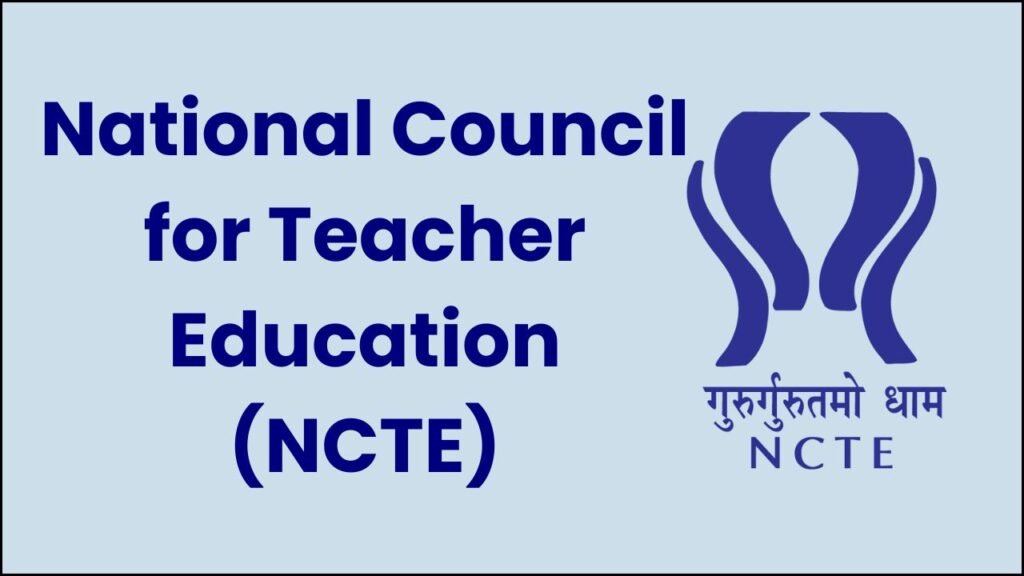
The National Council for Teacher Education (NCTE) plays a key role in shaping the future of teachers in India. Originally formed in 1973 as an advisory body, it gained statutory status in 1995 under the NCTE Act (No. 73 of 1993). This change gave it greater authority and resources to regulate and support teacher education across the country. With a strong foundation laid by the National Policy on Education (1986), the NCTE works towards a well-organized, high-quality teacher education system.
Table of Contents
Main Purpose of NCTE
Planned Development
- Ensures that teacher education develops in a structured and coordinated manner.
Standard Maintenance
- Establishes and maintains norms and standards across teacher training institutions.
Comprehensive Coverage
- Covers training at all levels: pre-primary, primary, secondary, and senior secondary.
- Includes training for non-formal, part-time, adult, and distance education.
Key Responsibilities of NCTE
Broad Roles of the Council
- Guides institutions, governments, and universities on teacher education plans.
- Ensures institutions maintain quality standards.
- Regulates the teacher training process from admissions to course delivery.
Functions of the NCTE
The table below outlines the major responsibilities and functions performed by the Council:
| Function | Explanation |
|---|---|
| Survey and Research | Conducts studies on teacher education and publishes findings. |
| Recommendations | Suggests plans and strategies to Central/State Governments and educational institutions. |
| Coordination | Monitors teacher education activities and encourages unified practices across India. |
| Qualification Guidelines | Sets minimum educational qualifications needed to become a teacher. |
| Course Norms | Decides who can join teacher education courses, the course content, duration, and admission method. |
| New Course Rules | The Issues norms for launching new training courses and setting up infrastructure. |
| Examination Standards | Sets rules for exams that lead to teacher education certificates or degrees. |
| Fee Structure | Issue guidelines on tuition and other fees in teacher education institutions. |
| Innovation and Research | Promotes new ideas and research in teacher education and shares outcomes. |
| Review and Advice | Regularly checks how well standards are followed and advises institutions accordingly. |
| Accountability Systems | Builds performance review systems and ensures that institutions are held responsible. |
| New Institution Planning | Plans and schemes for teacher education and help set up new recognized institutions. |
| Commercialization Control | Takes action to prevent profit-making practices in teacher education. |
| Other Government Tasks | Carries out additional responsibilities given by the Central Government. |
Achievements of NCTE
Educational Structure Building
- Helped in forming a clear structure for teacher training institutions.
Improved Quality of Teachers
- Created strong entry norms, course outlines, and qualification criteria for future teachers.
Nationwide Monitoring
- Ensured training institutes across states maintain a minimum standard.
Research Promotion
- Supported innovative teaching methods through research projects.
Fee Regulation
- Reduced exploitation by fixing reasonable fee limits.
Guidelines and Norms by NCTE
| Area | NCTE Role |
|---|---|
| Admissions | Sets the eligibility and selection process. |
| Course Duration | Defines the time needed to complete a teacher training course. |
| Curriculum | Provides curriculum structure and content. |
| Staffing | Sets staff qualifications and the number of staff required. |
| Infrastructure | Defines physical and learning resources that institutions must have. |
| Exams | Outlines testing methods and scoring guidelines. |
| Performance Review | Advises on improvements and checks accountability. |
Impact on Teacher Education
Better Trained Teachers
- Enhanced the overall quality of education in schools.
Equal Opportunity
- Created a uniform system, giving all students and teachers equal access to training.
Innovation Encouragement
- Helped bring modern teaching practices into training systems.
Controlled Fee Structure
- Allowed students from all economic backgrounds to join teacher education programs.
Stricter Approvals
- Ensured only genuine and well-equipped institutions received recognition.
Recent Developments and Future Plans
Digital Transformation
- Promotes online training platforms and digital curriculum models.
Inclusion and Diversity
- Focuses on training that supports inclusive education for differently-abled learners.
Teacher Exchange
- Plans to start collaborations with national and international institutions.
Eco-Friendly Education
- Encourages sustainability and environment-based learning practices in teacher training.
Challenges Faced by NCTE
| Challenge | Details |
|---|---|
| Unrecognized Institutions | Rise of fake training centers without proper accreditation. |
| Faculty Shortage | Lack of qualified staff in many institutions. |
| Infrastructure Gaps | Many centers operate with poor facilities. |
| Monitoring Issues | Difficulty in regularly checking thousands of institutions. |
| Resistance to Change | Institutions are reluctant to adopt modern teaching tools. |
Suggestions for Improvement
- Stronger Monitoring: Introduce real-time digital audits of institutions.
- Faculty Development: Launch regular training for teacher educators.
- Student Feedback: Collect feedback to improve the quality of courses.
- Public Awareness: Educate the public on recognized and fake institutions.
- Technology Integration: Use Artificial Intelligence (AI) for curriculum updates and performance tracking.
The Way Forward
The National Council for Teacher Education (NCTE) has been a guiding force in shaping India’s teacher education system. With a clear legal mandate and structured approach, the Council has helped improve teacher quality, course delivery, and educational access across the country. Though challenges remain, its efforts in research, regulation, and innovation continue to strengthen the education sector. A well-supported and empowered NCTE is essential for developing skilled teachers who can meet the learning needs of future generations.





